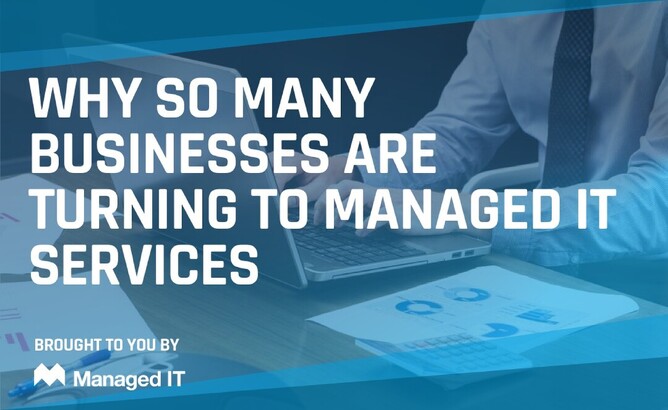As a business, you should always be looking to see how your business can become more efficient, and at the same time save on resources. Simply moving along with your business continuing to run things the way that you’ve always run them is an easy way for a competitor to step in and one up you – due to a more efficient process, product, service, or package.
And that’s why businesses are now seeing the benefit of turning to Managed IT Services to look after their IT infrastructure.
What is a Managed Service Provider?
A Managed Service Provider is an IT services caretaker for your business. They are responsible for providing your business with systems and network monitoring, maintenance, and management, across a wide variety of IT services. They are always available and proactive with taking care of your systems, providing unlimited support all for a flat fee per month. Managed Service Providers are experts at what they do, and can help with your IT strategy, implementation and support.
We’ll come back to Managed Service Providers in a minute, but for now, let’s take a closer look at your business, and your current IT configuration.
Where does your business stand in your IT journey right now?
How does your IT strategy look at the moment? Do you have in place a comprehensive plan that guides all management of your technology; your hardware, your staffing, your risk management, your services, IT configurations, user profiles, your uptime?
Your IT strategy should not be a static document. If you developed an IT strategy 5, or even 3 years ago, that hasn’t been updated, then your IT management is likely being run inefficiently. Keeping on top of an evolving strategy and document is key to ensuring your business is being run effectively; with the best practices in place to guarantee resources are wisely managed, your systems are secure, and your customers are being serviced to the best of your abilities.
This can be an incredibly tricky task for a small, and even medium sized business. It requires expert domain knowledge to carry out properly. Many businesses choose to bring in an analyst or consultant to help develop their IT strategy, and then struggle once this person and their knowledge leaves the business.
So, how can you stay on top of your IT strategy in 2020 and beyond? How can you make a mammoth task actually achievable, resource efficient, and effective?
What Managed IT Services Can Offer Your Business
Managed IT Services can help you to achieve the ‘Optimised’ stage of your business’s IT journey. Managed IT Services can work with your business in developing a comprehensive, flexible, forward-thinking IT strategy for your business, an IT strategy that helps you to have an advantage over the competition.
After helping to develop this roadmap with your business, an IT services provider helps to migrate your current configuration to the optimised model, provide staff with training on new systems, and then takes care of the ongoing IT services and management.
Using a Managed IT Services provider effectively outsources the management of your IT infrastructure, so that you don’t have to sweat about running out of server space, struggling through network configurations, trying to manage offsite staff access, dealing with file versioning and deletion, and any number of other IT issues that all businesses run into.
Why Managed Service Providers Are Becoming Increasingly More Popular
When we take a look back at the past 10 years of business IT infrastructure, it’s easy to see where things have been changing rapidly. Compared to then and now, we now have:
- A more mobile workforce, with more staff working remotely, or simply offsite for a day
- A more collaborative workforce, with expectations that we can reach anyone on the team within seconds, via messaging apps, etc.
- The rise of software as a service, allowing hosting of applications to be run offsite, rather than on company servers
- Cloud based everything, not just software as a service – file storage, user management, databases, virtual servers…
What this means for businesses, is that taking advantage of always on web based services – that allow access to any user, from anywhere, at any time, with guarantees of security, scalability, and availability – has become increasingly more important.
Managed Service Providers who offer managed cloud based IT solutions for businesses are now more popular as businesses recognize the benefits of switching to this model.
So, just what are the benefits or using a Managed Services Provider, especially if we are looking towards a future-proof cloud solution?
The Benefits of Switching to Managed IT Services
ROI / Efficiency:
While you may think that it might not be financially clever to engage the services of a Managed Services Provider, this is often not the case. Sit down and have a think about the cost involved in IT management and difficulties within your business.
Do you have a dedicated networking specialist on the team, an “IT guy”, or a handful of them? What happens when you have issues? How is productivity affected within your team? What happens when you lose data, or when someone happens to get a virus?
A Managed Services Provider can effectively and pre-emptively address all these issues, and many more – providing you with a more efficient IT infrastructure and service, and thus maximising your ROI.
Maintenance:
With IT systems, they require a fair amount of maintenance. This means system updates, software patches, rolling over to current application versions, management of software licenses, etc. etc. Installing once is simply not an option. A Managed Service Provider will continually ensure that your systems are up to date.
Reliability:
Managed IT Service Providers make a guarantee in the reliability of the services they offer as part of their binding contract with your business. These guarantees include items like 24/7/365 monitoring, and guarantees about network uptimes.
Strategy and Solution:
Craft the perfect IT strategy for your business with the help of the experts from a Managed IT Services provider. They have the know-how that you simply won’t find from within your team, with the ongoing support that an analyst or consultant cannot provide.
Scalability:
Experienced Managed Service Providers will ensure that whatever configuration they are in charge of is going to be scalable for your business purposes. They are able to scale your solutions in the background, so that you don’t need to worry about it.
Security:
Security is a number one concern of a Managed Service Provider. Your data and network security is worked into a comprehensive plan including encryption, data storage, and protection from viruses, spam, and other attacks.
Eliminating a Non-core Business Activity to Concentrate on Actual Business:
If your business is not in the IT space, then why should you need to have dedicated staff on the team, or have to bring in contractors, just to do IT activities? Outsourcing your IT services allows you to concentrate your business on your core activities.
Cloud Technology for a Mobile/Flexible Workforce:
Take advantage of cloud technology and trust a Managed Service Provider to take your business into 2020 and beyond by migrating to a cloud solution. Taking advantage of cloud technology will allow you to create a more mobile and flexible workforce.
Why Choosing a Local Managed Services Provider is Clever
While Managed Service Providers are always located offsite, choosing a local provider is beneficial for a number of reasons. This includes:
- Intimate knowledge of local issues, communication styles, IT infrastructures, and business concerns
- Availability for face to face meetings, which can be essential to business
- A better fit for your business
- Staff availabilities concentrated at the times that you need them the most
At Managed IT, we enjoy working with local partners to help them get the most out of their businesses.
Our Solutions
Managed IT offers a complete range of managed IT solutions for our partners, including monitoring, help desk, backup and disaster recovery, IT vendor management, public, private, and hybrid cloud migration and management, and security management.
Why not start the conversation about how Managed IT can help bring you into 2020 and beyond, with more competitive, reliable, stable, scalable systems and management?






